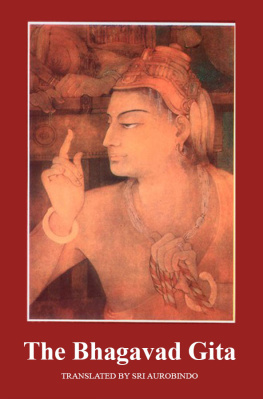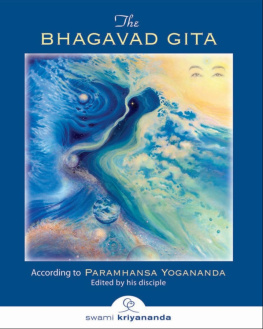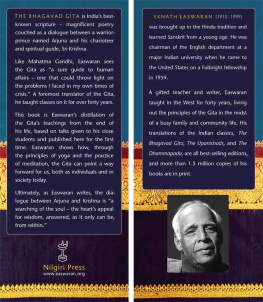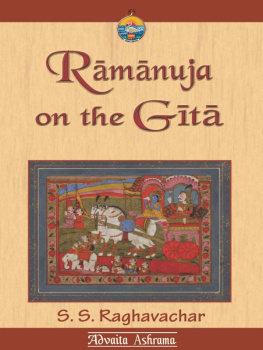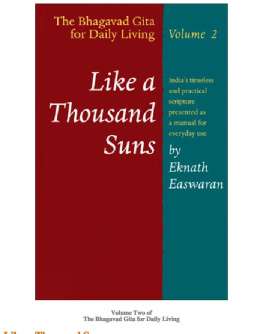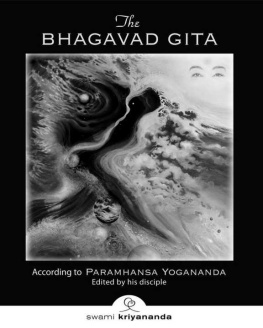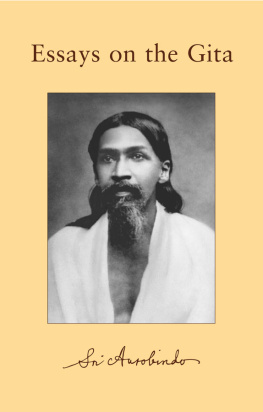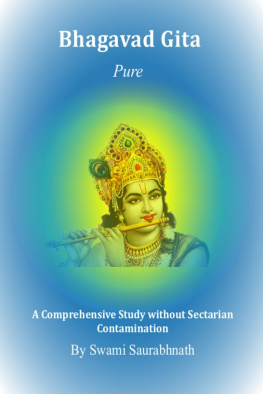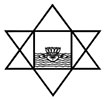The Bhagavat Gita
Sri Aurobindo
PARAPHRASE
This e-book had been prepared by Auro e-Books , a project dedicated to conversion, publishing and distribution of e-books on Well-Being and Spirituality.

Discover more e-books and other activities on our website:
www.auro-ebooks.com
Original source of the digital text:
Bernard's site for Sri Aurobindo and the Mother
http://intyoga.online.fr/
Note on the Text
The translation of the Gita presented here was compiled mainly from Sri Aurobindos Essays on the Gita. It first appeared in The Message of the Gita, edited by Anilbaran Roy, in 1938. Sri Aurobindo approved this book for publication; however, he made it clear in one of his letters that the translations in the Essays were more explanatory than textually precise or cast in a literary style. Many of them are paraphrases rather than strict translations. Sri Aurobindo also wrote that he did not wish extracts from the Essays to go out as my translation of the Gita. This should be borne in mind by the reader as he mattes use of this translation, which has been provided as a bridge between the Gita and Sri Aurobindos Essays.
Table of Contents
CHAPTER I
THE DEJECTION OF ARJUNA
(1. The Yoga of the Dejection of Arjuna)
1. Dhritarashtra said: On the field of Kurukshetra, the field of the working out of the Dharma, gathered together, eager for battle, what did they, O Sanjaya, my people and the Pandavas?
2. Sanjaya said: Then the prince Duryodhana, having seen the army of the Pandayas arrayed in battle order, approached his teacher and spoke these words:
3. "Behold this mighty host of the sons of Pandu, O Acharya, arrayed by Drupada's son, thy intelligent disciple.
4-6. Here in this mighty army are heroes and great bowmen who are equal in battle to Bhima and Arjuna: Yuyudhana, Virata and Drupada of the great car, Dhrishlaketu, Chekitana and the valiant prince of Kashi, Purujit and Kuntibhoja, and Shaibya, foremost among men; Yudhamanyu, the strong, and Uttamauja, the victorious; Subhadra's son (Abhimanyu) and the sons of Draupadi; all of them of great prowess.
7. On our side also know those who are the most distinguished. O best of the twice-born, the leaders of my army; these I name to thee for thy special notice.
8-9. Thyself and Bhishma and Kama and Kripa, the victorious in battle, Ashvatthama, Vikarna, and Saumadatti also; and many other heroes have renounced their life for my sake, they are all armed with diverse weapons and missiles and all well-skilled in war.
10. Unlimited is this army of ours and it is marshalled by Bhishma, while the army of theirs is limited, and they depend on Bhima.
11. Therefore all ye standing in your respective divisions in the different fronts of the battle, guard Bhishma."
12. Cheering the heart of Duryodhana. the mighty grandsire (Bhishma). the Ancient of the Kurus, resounding the battlefield with a lion's roar, blew his conch.
13. Then conchs and kettledrums, tabors and drums and horns, suddenly blared forth, and the clamour became tremendous.
14. Then, seated in their great chariot, yoked to white horses. Madhava (Sri Krishna) and the son of Pandu (Arjuna) blew their divine conchs.
15-16. Hrishikesha (Krishna) blew his Panchajanya and Dhananjaya (Arjuna) his Devadatta (god-given); Vrikodara of terrific deeds blew his mighty conch, Paundra; the King Yudhishthira, the son of Kunti, blew Anantavijaya, Nakula and Sahadeva, Sughosha and Manipushpaka.
17-18. And Kashya of the great bow, and Shikhandi of the great chariot, Dhrishtadyumna and Virata and Satyaki, the unconquered, Drupada, and the sons of Draupadi, O Lord of earth, and Saubhadra, the mighty-armed, on all sides their several conchs blew.
19. That tumultuous uproar resounding through earth and sky tore the hearts of the sons of Dhritarashtra.
20. Then, beholding the sons of Dhritarashtra standing in battle order, and the flight of missiles having begun, the son of Pandu (Arjuna), whose emblem is an ape, took up his bow and spoke this word to Hrishikesha, O Lord of earth:
21-23. Arjuna said: O Achyuta (the faultless, the immovable), stay my chariot between the two armies, so that I may view these myriads standing, longing for battle, whom I have to meet in this holiday of fight, and look upon those who have come here to champion the cause of the evil-minded son of Dhritarashtra.
24-25. Sanjaya said: Thus addressed by Gudakesha (one that has overcome sleep. Arjuna), Hrishikesha, O Bharata, having stayed that best of chariots between the two armies, in front of Bhishma, Drona and all the princes of earth, said: "O Partha, behold these Kurus gathered together."
26-27. Then saw Partha standing upon opposite sides, uncles and grandsires, teachers, mother's brothers, cousins, sons and grandsons, comrades, fathers-in-law, benefactors.
27-28. Seeing all these kinsmen thus standing arrayed, Kaunteya, invaded by great pity, uttered this in sadness and dejection:
28-30. Arjuna said: Seeing these my own people, O Krishna, arrayed for battle, my limbs collapse and my mouth is parched, my body shakes and my hair stands on end; Gandiva (Arjuna's bow) slips from my hand, and all my skin seems to be burning.
30-31. I am not able to stand and my mind seems to be whirling; also I see evil omens, O Keshava.
31-32. Nor do I see any good in slaying my own people in battle; O Krishna, I desire not victory, nor kingdom, nor pleasures.
32-36. What is kingdom to us, O Govinda, what enjoyment, what even life? Those for whose sake we desire kingdom, enjoyments and pleasures, they stand here in battle, abandoning life and riches teachers, fathers, sons, as well as grandsires, mother's brothers, fathers-in-law, grandsons, brothers-in-law, and other kith and kin; these I would not consent to slay, though myself slain, O Madhusudana, even for the kingdom of the three worlds; how then for earth? What pleasures can be ours after killing the sons of Dhritarashtra. O Janardana?
36-37. Sin will take hold of us in slaying them, though they are the aggressors. So it is not fit that we kill the sons of Dhritarashtra, our kinsmen; indeed how may we be happy, O Madhava, killing our own people?
38-39. Although these, with a consciousness clouded with greed, see no guilt in the destruction of the family, no crime in hostility to friends, why should not we have the wisdom to draw hack from such a sin, O Janardana, we who see the evil in the destruction of the family?
40. In the annihilation of the family the eternal traditions of the family are destroyed; in the collapse of traditions, lawlessness overcomes the whole family,
41. Owing to predominance of lawlessness, O Krishna, the women of the family become corrupt; women corrupted, O Varshneya, the confusion of the Varnas arises.
42. This confusion leads to hell the ruiners of the family, and the family; for their ancestors fall, deprived of pinda (rice offering) and libations.
43. By these misdeeds of the ruiners of the family leading to the confusion of the orders, the eternal laws of the race and moral law of the family are destroyed.
44. And men whose family morals are corrupted, O Janardana, live for ever in hell. Thus have we heard.

